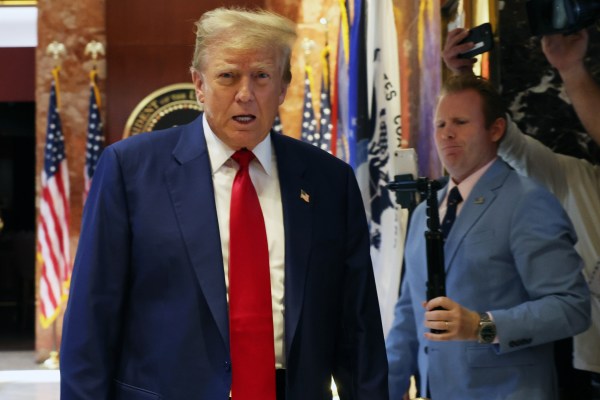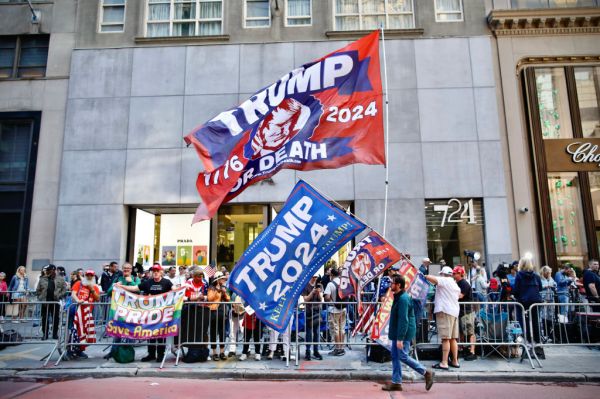Last night, a friend and I were discussing The Event and he threw a hypothetical at me.
What if Ken Paxton, the attorney general of Texas, had brought charges there this year against Joe Biden similar to those Donald Trump was just convicted on? And what if a jury in Paxton’s solidly Republican state had found Biden, a Democrat, guilty months before the election?
How would Biden voters feel about that?
I take his point. In some ways, the analogy understates how dubious Trump’s prosecution was.
Manhattan District Attorney Alvin Bragg didn’t just indict him in the thick of a presidential cycle, he indicted him for something that happened eight years ago, before Trump became president. The only reason the statute of limitations didn’t bar him from doing so is because of an esoteric legal theory Bragg used to elevate misdemeanors to felonies by dint of a related but unproven “second crime” that Trump had supposedly committed. The offenses with which Trump was charged are rarely used in New York to support an indictment, too. Typically they’re lesser charges in a case alleging more serious crimes.
And Bragg isn’t any random Democratic prosecutor. During his campaign for district attorney, he implied that his office would make holding Trump “accountable” a priority. That sales pitch ended up getting him elected in 2021 in a district dominated by liberals. Realistically, you couldn’t ask for more evidence of a political motive.
“It is fundamental to our American system of justice that the government prosecutes cases because of alleged criminal conduct regardless of who the defendant happens to be. In this case the opposite has happened,” Sen. Susan Collins said last night. “The district attorney, who campaigned on a promise to prosecute Donald Trump, brought these charges precisely because of who the defendant was rather than because of any specified criminal conduct.”
That’s the whole argument against Bragg’s case in three sentences. A few days ago in a piece for National Review, former Bush official John Yoo went a step further by quoting a famous line from Stalin’s notorious capo, Lavrentiy Beria. “Show me the man and I’ll show you the crime,” Yoo wrote, imputing that attitude to the various prosecutors who have charged Trump over the past 15 months.
Weeks before he was indicted in Manhattan last spring, I laid out my own misgivings about the charges. If you’re going to drop a legal atomic bomb on an already fraught presidential race, it has to be for something graver than falsifying business records nearly a decade ago. There’s no better way to cultivate the sort of contempt for institutions on which Trumpy populism thrives than for its opponents to treat respect for civic norms as conditional.
A conscientious citizen is obliged to worry about this. But a conscientious citizen is not obliged to sit quietly while post-liberal cretins in Trump’s cult disingenuously lecture them about it.
Let’s talk about Ken Paxton.
Show of hands: Who thinks Ken Paxton, out of solemn respect for civic norms, would decline to indict Joe Biden if he had probable cause to believe Biden had committed a crime?
Paxton is the same Trump sycophant who filed the inane lawsuit after the 2020 election that sought to exclude the electoral votes of swing states won by Biden. Had he prevailed, America would have faced a constitutional crisis unlike any since 1860. Paxton also happens to be so corrupt that he came this close to being impeached and removed as attorney general by a legislature dominated by his own party. He avoided that fate only because Trump himself intervened on his behalf.
It’s not “norms” that’s stopped him from prosecuting Biden in Texas. It’s the fact that, unlike Alvin Bragg, Paxton doesn’t have evidence of a crime. The same goes for House Republicans’ endless investigation into the president. If Reps. James Comer and Jim Jordan had the goods, they would eagerly impeach Biden in an election year. In fact, refusing to do so out of concerns for “norms” would likely mean the end of their careers once Trump got wind of their “disloyalty.”
They haven’t impeached Biden because they can’t find anything to pin on him. Full stop.
Bone-deep dishonesty about respect for norms is the first thing to recognize in the dark warnings today that “two can play at this game!” from people who enthusiastically supported a coup attempt three years ago. Coup apologists do not care about norms, by definition. They’re not angry that Democrats haven’t shown proper respect for electoral fair play by convicting Trump, they’re angry that this was something done to their side rather than something their side did to the other.
The entire point of Donald Trump’s worldview is to be unapologetically ruthless in seeking advantage, norms be damned. And from the jump, the right has embraced it. “The party that has thrice nominated a greedy, prideful, mendacious, wrathful, bigot who gleefully slanders others, admitted to sexual assault on tape, [and] defrauded poor people who attended his fake university somehow believe they have been taking the moral high ground?” an astonished Tim Miller asked today about the sudden Strange New Respect for norms on the right.
I think they do believe it. I get the sense from many Trump supporters that they’d be willing to go much further than a coup or putting Joe Biden on trial in the name of excluding leftists from power permanently and should be appreciated for the “restraint” they’ve shown thus far. The sentiments we’re seeing on social media today, e.g., “I used to hate Trump but then he got convicted for a crooked cover-up of a hush-money scheme so now I’m a fascist,” suggest that the verdict in Manhattan has become a timely excuse to shed a little more of that restraint.
Being MAGA means forever blaming others for your own illiberal impulses.
Another strain of dishonesty in the backlash to Trump’s conviction is the particular focus on Alvin Bragg. As noted, there are sound reasons to find his handling of the case problematic. It smells of politics, it’s legally shaky, and it’s caused an enormous amount of civic tumult already over crimes that simply aren’t that serious. He didn’t need to bring these charges.
The dishonest part is that most Republicans whining about Bragg today would be whining just as much if Trump had been convicted in one of the other three cases pending against him. And those cases are considerably stronger on the evidence and significantly graver with respect to the crimes they allege: One has to do with Trump’s chicanery in trying to overturn the election, another has to do with his election tampering in Georgia, and the third has to do with him obstructing the Justice Department’s effort to recover classified material stashed at Mar-a-Lago.
All of those speak directly to his fitness as president. Someone who cares earnestly about norms and good governance should want him to answer those charges. His supporters emphatically do not, needless to say.
Even conservatives who should know better, like John Yoo, aren’t above trying to delegitimize the other three cases by lumping them together with Bragg’s much weaker indictment. “In bringing a series of deeply flawed cases against Trump,” Yoo wrote, “both federal and local prosecutors have … targeted an unpopular figure first and looked for the crime second.”
Pure nonsense. The truth is literally the opposite: Trump’s coup plot was so egregious, and his concealment of classified documents so brazen, that he all but dared law enforcement to hold him accountable for either. No one had to “look” for the crimes; he committed them in plain sight, seemingly believing that his political stature would shield him from accountability.
His fans seemed to believe it too. Their problem with the Bragg case fundamentally isn’t that it’s too weak to justify prosecuting him, it’s that they regard any attempt to hold Trump criminally accountable as per se unfair so long as he’s active in politics. The tantrum they’re throwing today would hardly have been different had he been convicted in the January 6 case or the Georgia case or the classified documents case. They want Trump placed above the law, not just in Manhattan but everywhere.
Sometime soon the Supreme Court will rule that, no, of course presidents don’t enjoy “absolute immunity” from criminal charges for anything and everything they might do while in office. When that ruling is issued, pay attention to how the MAGA droogs screeching about a “banana republic” today react. Are they pleased that the judiciary struck a blow for the rule of law by refusing to grant monarchical privileges to the head of the executive branch?
Or are they screeching again?
Another question: Does Alvin Bragg’s case against Trump gain any legitimacy from the fact that it ended with a conviction?
One can argue that it doesn’t, as Americans have been lawfully convicted of all sorts of dubious crimes over the last 200-plus years. Rosa Parks was found guilty of disorderly conduct for refusing to give up her seat on a bus to someone white, entirely by the book at the time. I don’t think the fact of a conviction redeems Bragg’s decision to pursue a case whose civic cost will grossly exceed the benefit of holding Trump to account for falsifying business records.
But most of us would agree that the case would have lost legitimacy from an acquittal, no?
Some Trumpers are putting on a brave face today by boasting that his conviction will end up helping him in the polls (it’s certainly helped his fundraising!), but that has a doth-protest-too-much air about it and not just because it makes his determined efforts to delay his other trials hard to explain. The obvious truth is that an acquittal would have been a tremendous political victory for him. He’d have beaten “the deep state” at its own game; the verdict would have been seen as validation of the right’s critique that Bragg’s case was a castle built on sand, illegitimate to its core. The jury had seen through Democrats’ “lawfare” and repudiated it, we’d be told.
Acquittal would have almost guaranteed a Trump polling bounce, I think. It would have cast doubt by association on the merits of the other cases pending against him and given undecided voters moral cover to conclude that civic concerns about a second term for him must be overblown.
Instead, we have a conviction. And insofar as a conviction does anything to redeem Bragg’s case, it’s this: Twelve citizens who aren’t part of “the deep state” looked at the evidence and concluded, “Yep, he did it.”
Wade through right-wing social media today and you’ll find endless comparisons between Trump and famous martyrs of oppressive legal systems, each one stupider and more offensive than the last—Alexei Navalny, Aleksandr Solzhenitsyn, the apostles, even Jesus Christ himself. The wrinkle in Trump’s case is that he was prosecuted using the same procedures that Republicans typically take for granted as hallmarks of due process. He was indicted by a grand jury; he had the right to remain silent; he mounted a defense, albeit not very effectively; and not until 12 Americans drawn from outside the justice system said so was he held responsible.
When Lavrentiy Beria said “find me the man and I’ll find you the crime,” that isn’t what he had in mind.
If they can do it to him, they can do it to you, some Trump apologists warned after the verdict, neglecting to explain why “they” haven’t “done it” to all manner of other prominent Republicans like Ron DeSantis. But it’d be truer to say that if they can do it to you, they can do it to him. That’s what it means for someone to not be above the law: Trump gets the same rights and procedures in court that you would if you were charged with a crime. How else should a country that doesn’t recognize titles of nobility operate?
Frankly, you’ll get less due process than he got. If you’re ever on trial and the presiding judge finds you in contempt 10 times, the penalty will be more than a fine and a lecture, I promise.
Had Trump been acquitted, the idea that if they can do it to him, they can do it to you would have been more potent. It would have been outrageous that Bragg had brought a case like this to trial that couldn’t withstand a jury’s scrutiny. The DA would have smeared the Republican nominee for president with allegations of crimes that the evidence ultimately couldn’t prove. In the middle of a national campaign, he would have abused the power of the state to baselessly impugn a political figure despised by his party.
But it wasn’t baseless, it turns out. Trump did it. Does that count for anything?
It does not, it seems. The jury’s verdict means so little to Trump supporters that Larry Hogan, the GOP’s nominee for Senate in Maryland, was all but excommunicated from the party by Trump’s campaign manager when he tweeted that Americans should “respect the verdict and the legal process.” Literally overnight, believing that no jury in a blue district can fairly convict a populist hero has become a Republican litmus test.
That’s post-liberalism in its glory. One’s respect for the system depends entirely on its ability to deliver the desired outcomes, not the desired procedures.
Every pundit who comments on the trial is professionally obligated to predict whether the verdict will help Trump in the polls or hurt him.
There are good arguments both ways. Maybe the supernova of media coverage will reach some of those “disengaged voters” we’ve heard so much about lately and move them into Joe Biden’s column. Or maybe it’ll convince a bunch of partisan conservatives who’ve been looking for excuses to support Trump to finally take the plunge: Thanks to Democrats, their only choice now is to defend the rule of law by reelecting a guy who’s still facing 57 criminal charges related to election tampering and national security and whose last act as a public official four years ago was trying to stage a putsch.
Whether you think Trump will benefit or not from the verdict is, I suspect, a function of how civically perverted you believe Americans generally and the right more broadly to be in 2024. Is this country so far past saving that a jury conviction on felony charges might actually increase a candidate’s presidential chances?
You can guess my answer to that.
I’m okay with it, though. Lately I’ve found that the likelier it becomes that Trump is reelected, the more at peace with it I am. For this simple reason: Those who vote for him will deserve what he does to this country in a second term. Truly.
And there’s some moral satisfaction in that. In a properly functioning democracy, the people get the government they deserve. Our democracy must be functioning properly because we deserve Trump and I think we’re going to get him.
“If you took a Time Machine and told Republican leaders in 2015 that Trump would end up being convicted on some porny business-fraud stuff, I’m sure they would have been shocked and assumed no possible explanation except the end of democracy,” Semafor’s Benjy Sarlin joked on Friday. But that’s not really a joke. That Trump would get tangled up in all manner of unethical and eventually illegal behavior, that he would turn politics into an authoritarian clown show, that his personality cult would become a cancer on American institutions, was apparent from the start of his political career. The Never Trump faction emerged early for a reason.
Republicans either never reckoned with his destabilizing influence or they grew to cherish it, even after January 6 when a credible populist like DeSantis presented himself as an alternative. So, nine years later, the ethos of Trump’s party is a sinister twist on Beria’s sinister quote: Show me the man and I’ll show you why he can’t ever be held accountable for the crime.
In the end, I think the only thing to celebrate about the verdict in the Bragg case is that it’ll make a Trump victory in November a bit more embarrassing for the United States. The coup plot, the impeachments, the hide-the-documents fiasco at Mar-a-Lago, the comically over-the-top demagoguery in which he now routinely engages on the stump are all deeply humiliating in The People’s Choice, but “convicted felon” will make the disgrace we deserve that much more robust.
Maybe something good will come from the Bragg case after all.







Please note that we at The Dispatch hold ourselves, our work, and our commenters to a higher standard than other places on the internet. We welcome comments that foster genuine debate or discussion—including comments critical of us or our work—but responses that include ad hominem attacks on fellow Dispatch members or are intended to stoke fear and anger may be moderated.
With your membership, you only have the ability to comment on The Morning Dispatch articles. Consider upgrading to join the conversation everywhere.